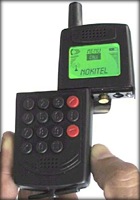 Here a one for the "What were they thinking file"...
Here a one for the "What were they thinking file"...At first sight it looks like a regular cell phone — same size, same shape, same overall appearance.
But beneath the digital face lies a .22-caliber pistol, a phone gun capable of firing four rounds in quick succession with a touch of the otherwise standard keypad.
The US Department of Homeland Security and the FBI are aware of the device and have instructed baggage screeners to be on the lookout for suspicious mobile phones. This is especially after 9/11.
European law enforcement officials — stunned by the discovery of these deadly decoys — say phone guns are changing the rules of engagement in Europe.
Airport authorities across Europe are implementing systems to X-ray all cell phones
“We find it very, very alarming,” says Wolfgang Dicke of the German Police union. “It means police will have to draw their weapons whenever a person being checked reaches for their mobile phone.”
The FBI, the Bureau of Alcohol, Tobacco and Firearms, and the U.S. Customs Service say they’ve been briefed on the new weapons.
“This criminal invention represents a potentially serious threat to law enforcement and the public,” said U.S. Customs Service Commissioner Raymond W. Kelly.
“We received word about these guns last month. We have since alerted our field personnel to be on the lookout for ‘cell phone guns’ at U.S. ports of entry.”
Full story and video here.













